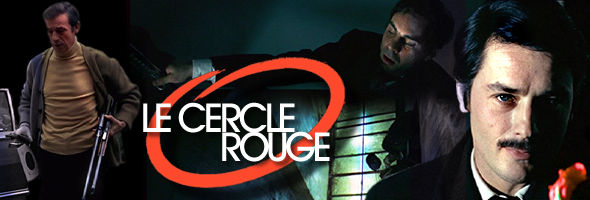
Color, 1970, 140m. / Directed by Jean-Pierre Melville / Starring Alain Delon, Yves Montand / Criterion (US R1 NTSC) / WS (1.85:1) (16:9)
Recently released from prison, Corey (Delon) decides to exact a little retribution against his boss, Rico (André Ekyan), who also swiped Corey's girl. To restore himself financially and profesionally, Corey embarks on a carefully planned jewel heist with the aid of escaped convict Vogel (Gian Maria Volonté), who slips into Corey's car by chance after a daring train escape, and a boozing ex-cop/marksman, Jansen (Montand). Meanwhile cat-happy Commissioner Mattei (André Bourvil) is none too pleased about Vogel's escape and, while tracking him down, learns of details involving the impending robbery at a Place Vendôme shop.
Skillfully balancing gangster chic (the typical fedoras, trenchcoats, and ever-burning cigarettes are all in abundance) with beautifully executed suspense sequences, Le Cercle Rouge (shown in a shorter, English language variant as The Red Circle) is certainly one of Melville's finest achievements, though its exact placement in his pantheon will be mostly a matter of viewer preference. The mammoth running time allows plenty of room for the characters to breathe and exude squinty-eyed moral complexity, while the occasional flashy flourishes (such as a swinging nightclub run by Nights of Cabiria's François Périer and a memorable DT-inspired vision involving spiders) make this satisfying as a piece of Eurocult thrillmaking as well. Delon has rarely been better; deglamorized a bit here, he manages to keep attention anchored on his criminal pursuits whenever the film threatens to spin off on another tangent. From a technical standpoint Melville's directorial style remains fresh and immediate; the soggy, autumnal woods where Corey meets his old boss make for a surprising change from the norm, and the robbery itself allows for some striking use of cinematic
Criterion's double-disc set presents the film itself on the first DVD in an immaculate widescreen transfer. Detail and color look excellent, and the optional subtitles are easy to read and a welcome relief after years of bad video copies. The second disc boasts a wealth of Melville-related extras, including half an hour of on-set footage from the making of the film in which the director, Delon, Montand, and Bourvil are seen at work and stop to speak to the camera. Also included is a lengthy segment from Cineastes de notre temps: Jean-Pierre Melville, an older French TV documentary in which the director discusses his work and is seen hard at work on production. Other extras include the original and reissue trailers (pretty much the same except for a "John Woo Presents" tag and different title cards), an extensive gallery of production and publicty stills and art, and a thick booklet containing liner notes by Michael Sragow (who draws numerous parallels between Melville and his literary namesake), exerpts from a text interview with Rui Nogueira in the book Melville on Melville, a recollection by composer Eric Demarsan, ruminations on the title's meaning by Chris Fujiwara, and a brief text appraisal by John Woo. Nogueira also turns up for a video interview in which he discusses the film's placement in Melville's filmography and examines some of its prominent themes, while Melville's assistant director, Bernard Stora, turns up for a separate video interview in which he tackles the film from a more technical standpoint.
Color, 1971, 100m. / Directed by Jean-Pierre Melville / Starring Alain Delon, Richard Crenna, Catherine Deneuve / Anchor Bay (US R1 NTSC) / WS (1.85:1) (16:9)
One of France's least heralded master directors, Jean-Pierre Melville was virtually unknown by most English speaking cineastes until hip and trendy talents like John Woo began singing his praises and noting his influence on such films as The Killer.
In the protracted and suspenseful opening sequence, a gang of robbers lay seige to a coastal town bank during a misty winter afternoon. Led by master criminal Simon (Richard Crenna), the looters escape and instigate plans for an audacious heist involving a moving train and a helicopter (the film's most famous and celebrated set piece). Meanwhile Simon's plans are being tracked by icy cool, jaded police commissioner Edouard Coleman (Delon), whose tumultuous relationship with fluffy-haired blonde Cathy (Catherine Deneuve) is waylaid by his regrettable friendship with Simon... who's also in love with Cathy. Eventually both men must put their friendship aside and face off in a battle of wits.
Fans of Michael Mann's Heat will undoubtedly be fascinated to see essentially the same storyline handled over twenty years earlier, right down to the same obsessive blue tint in every scene. Apart from the awkwardness of hearing Crenna dubbed in French, both he and Delon make for good Melvillian antagonists who share a common unspoken
Given the sparse availability of Melville films on video around the world, apart from three non-subtitled anamorphic DVD releases in France and passable VHS editions of Le Samouraï and Le Doulos, Anchor Bay's release of Un Flic is a welcome turn against the tide. The presentation looks terrific, rendering this potentially tricky film's color schemes with great skill and attention to detail. A few outside helicopter shots during the main robbery look a little muddy and shaky, but this is most likely a handicap carried over from the original materials. Dubbed bootleg tapes of this title have made the rounds for a few years, but now they can thankfully be consigned to the trash bin. The disc also includes an insert reproducing the theatrical poster, as well as an oblique European trailer which recuts the opening five minutes to very puzzling effect.
With his pivotal Le Samouraï in 1967, French cinematic crime specialist Melville began pushing his stories of cops and robbers into increasingly stylized territory, culminating in his penultimate film, the operatic Le Cercle Rouge. Once again starring Delon, this razor-sharp heist film (a probable influence on
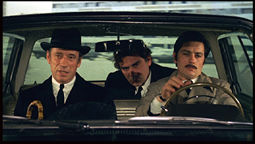 Michael Mann and Walter Hill, not to mention the self-admitted John Woo) operates like an existential primer on fate and morality, as indicated by the mystical title (cited from a fabricated Buddhist quote in the first scene).
Michael Mann and Walter Hill, not to mention the self-admitted John Woo) operates like an existential primer on fate and morality, as indicated by the mystical title (cited from a fabricated Buddhist quote in the first scene).
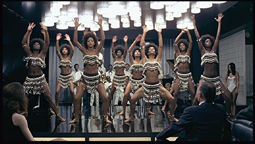
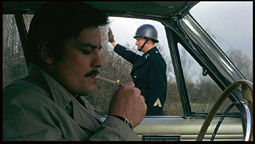 space and movement to generate tension both in the viewer and between the archetypal characters.
space and movement to generate tension both in the viewer and between the archetypal characters.
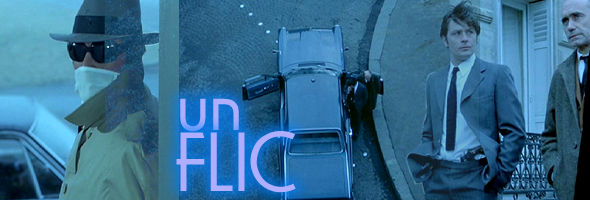
 Melville's only notable U.S. release, 1967's masterful Le Samouraï, was thrown away under the title of The Godson, but in Europe it became a cult sensation and earned a new legion of followers for heartthrob Alain Delon. Best known to that point as the picture perfect, talented star of fare like Rene Clement's Purple Noon, Delon revealed a grittier side in front of Melville's camera and went on to star in two of the director's other masterpieces, 1970's frequently censored The Red Circle and Melville's last film, Un Flic (dubbed and barely shown by Allied Artists in 1975 as Dirty Money).
Melville's only notable U.S. release, 1967's masterful Le Samouraï, was thrown away under the title of The Godson, but in Europe it became a cult sensation and earned a new legion of followers for heartthrob Alain Delon. Best known to that point as the picture perfect, talented star of fare like Rene Clement's Purple Noon, Delon revealed a grittier side in front of Melville's camera and went on to star in two of the director's other masterpieces, 1970's frequently censored The Red Circle and Melville's last film, Un Flic (dubbed and barely shown by Allied Artists in 1975 as Dirty Money).
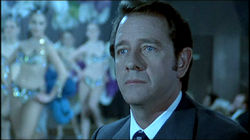
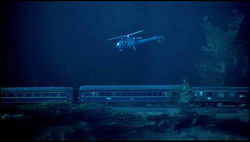 bond; it's also both fascinating and a bit unsettling to see Delon's chiseled looks fading into a more world weary, embittered visage that has obviously seen far too much. The supporting characters (including Deneuve) barely have a chance to register, with Melville devoting most of his attention to the two actors' line delivery, stances, and relationships with their natural and man made landscapes.
bond; it's also both fascinating and a bit unsettling to see Delon's chiseled looks fading into a more world weary, embittered visage that has obviously seen far too much. The supporting characters (including Deneuve) barely have a chance to register, with Melville devoting most of his attention to the two actors' line delivery, stances, and relationships with their natural and man made landscapes.
